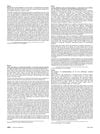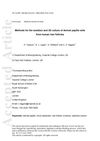
research Acne
58 citations,
January 1997 in “Dermatologic Clinics” Acne significantly affects mental health and quality of life, with research suggesting hormonal and genetic factors in its development and emphasizing early treatment to prevent scarring.
 185 citations,
February 2018 in “Journal of Investigative Dermatology”
185 citations,
February 2018 in “Journal of Investigative Dermatology” Melatonin may benefit skin health and could be a promising treatment in dermatology.
 March 2014 in “Journal of The American Academy of Dermatology”
March 2014 in “Journal of The American Academy of Dermatology” Reflectance confocal microscopy can noninvasively diagnose onychomatricoma by showing unique features different from healthy nails or nail fungus.
 51 citations,
March 2019 in “Journal of cellular physiology”
51 citations,
March 2019 in “Journal of cellular physiology” Platelet lysate is a promising, cost-effective option for regenerative medicine with potential clinical applications.
 33 citations,
January 2017 in “Conservation physiology”
33 citations,
January 2017 in “Conservation physiology” Measuring reproductive hormones in brown bear hair could help identify their sex and reproductive state, but better collection methods or lab techniques are needed.
 3 citations,
January 2016 in “International Journal of Trichology”
3 citations,
January 2016 in “International Journal of Trichology” Sheep-derived factors improve human hair cell clustering, which may help hair growth.
 September 2008 in “Fertility and Sterility”
September 2008 in “Fertility and Sterility” Free fatty acids may increase androgen production, potentially contributing to polycystic ovary syndrome.
 56 citations,
October 1983 in “Archives of Dermatology”
56 citations,
October 1983 in “Archives of Dermatology” Some women with acne have higher levels of free testosterone, which might suggest using hormonal treatments for acne.
 1 citations,
August 2023 in “Cutis”
1 citations,
August 2023 in “Cutis” Low ferritin levels can indicate iron deficiency as a cause of hair loss.
 March 2014 in “Journal of The American Academy of Dermatology”
March 2014 in “Journal of The American Academy of Dermatology” Vitamin D deficiency is common in temporary hair loss, and stress is often a suspected cause.
 62 citations,
January 2013 in “Skin Pharmacology and Physiology”
62 citations,
January 2013 in “Skin Pharmacology and Physiology” Low iron and vitamin D levels are linked to hair loss in women.
 55 citations,
April 2017 in “Experimental Dermatology”
55 citations,
April 2017 in “Experimental Dermatology” The document describes a way to isolate and grow human hair follicle cells in 3D to help study hair growth.
 30 citations,
August 1992 in “The Journal of Clinical Endocrinology and Metabolism”
30 citations,
August 1992 in “The Journal of Clinical Endocrinology and Metabolism” Finasteride doesn't affect hormone levels in normal men.
 29 citations,
April 2020 in “Biomolecules”
29 citations,
April 2020 in “Biomolecules” The 3D scaffold helped maintain hair cell traits and could improve hair loss treatments.
 9 citations,
November 2018 in “Drug Discovery Today”
9 citations,
November 2018 in “Drug Discovery Today” Using skin stem cells and certain molecules might lead to scar-free skin healing.
 8 citations,
September 2018 in “Journal of Cosmetic Dermatology”
8 citations,
September 2018 in “Journal of Cosmetic Dermatology” Lower irisin levels in the blood may indicate more severe acne.
 2 citations,
April 2021 in “International Journal of Pharmaceutics”
2 citations,
April 2021 in “International Journal of Pharmaceutics” Serum formulations were better at delivering molecules to the hair bulb than nanoparticles.
 2 citations,
August 2011 in “InTech eBooks”
2 citations,
August 2011 in “InTech eBooks” New methods for growing skin cells can improve skin grafts by building blood vessels within them.
 May 2024 in “International journal of research in dermatology”
May 2024 in “International journal of research in dermatology” Low vitamin D levels are linked to increased risk of male pattern baldness.
 January 2012 in “Vitamins & trace elements”
January 2012 in “Vitamins & trace elements” Smoking and drinking can lower vitamin levels and potentially trigger early hair loss, but overall vitamin levels don't seem to affect hair loss duration.
 1 citations,
February 2010 in “Proceedings of SPIE”
1 citations,
February 2010 in “Proceedings of SPIE” Low level laser therapy may help regenerate hair cells in the ear after damage from gentamicin.
 March 2024 in “International Journal of Clinical Pharmacokinetics and Medical Sciences”
March 2024 in “International Journal of Clinical Pharmacokinetics and Medical Sciences” Herbal hair serums offer multiple hair and skin benefits and are becoming more popular.
 121 citations,
March 1989 in “Journal of Investigative Dermatology”
121 citations,
March 1989 in “Journal of Investigative Dermatology” Minoxidil can help grow hair in mice by making cells grow and improving hair quality. More research needed.
 19 citations,
January 1987 in “Dermatology”
19 citations,
January 1987 in “Dermatology” Minoxidil slows down skin cell growth and may help treat scars and skin conditions.
 15 citations,
October 2016 in “Steroids”
15 citations,
October 2016 in “Steroids” Researchers developed a new method to find substances in herbs that can block a specific enzyme linked to hair loss.
 14 citations,
February 2021 in “International Journal of Pharmaceutics”
14 citations,
February 2021 in “International Journal of Pharmaceutics” Deer antler velvet serum helps hair grow and is safe for skin.
 June 2019 in “Stem Cell Research”
June 2019 in “Stem Cell Research” Scientists created MUSIi010-A, a stem cell line from a balding man's scalp, to study hair loss and develop potential treatments.
 773 citations,
August 2017 in “International Journal of Molecular Sciences”
773 citations,
August 2017 in “International Journal of Molecular Sciences” The secretions of mesenchymal stem cells could be used for healing without using the cells themselves.
 49 citations,
November 2014 in “Journal of Medicinal Food”
49 citations,
November 2014 in “Journal of Medicinal Food” Red Ginseng Extract may help human hair grow by activating growth pathways and blocking negative effects of certain hormones.
 38 citations,
January 2011 in “Endocrine Journal”
38 citations,
January 2011 in “Endocrine Journal” Weight loss and metformin don't significantly change vaspin levels in women with PCOS.






























